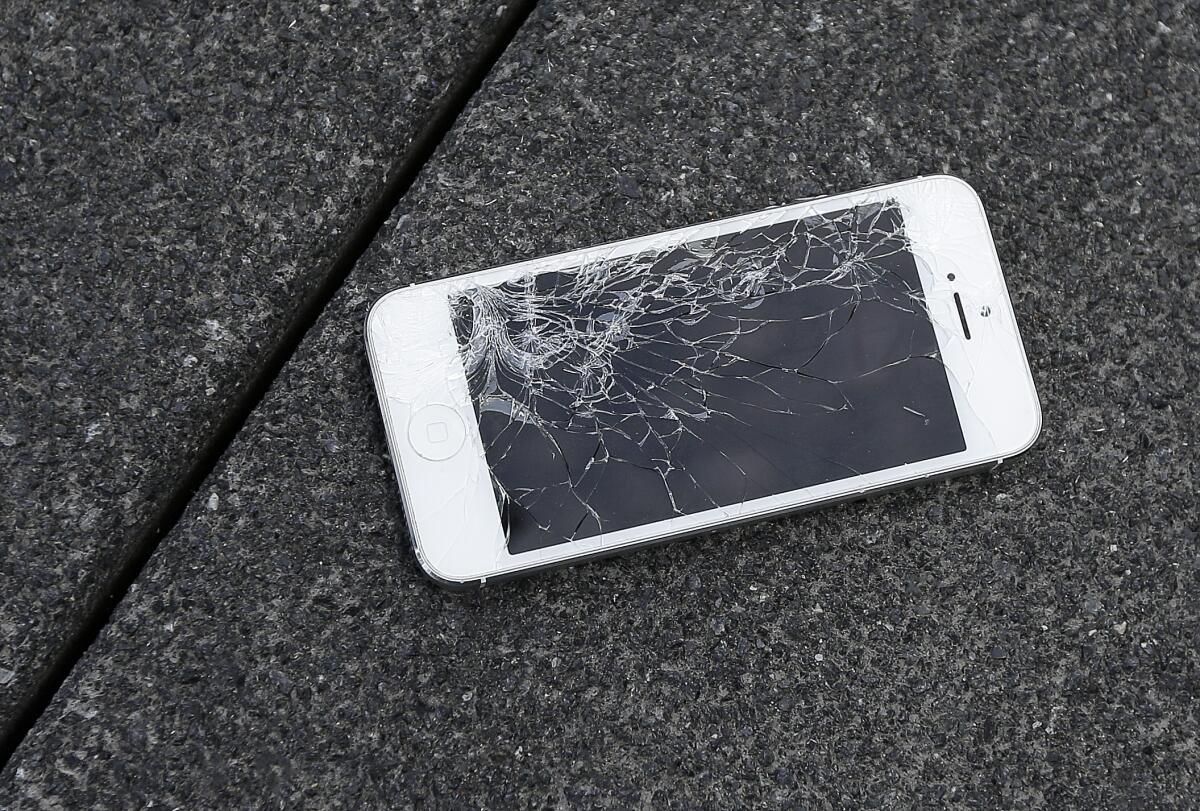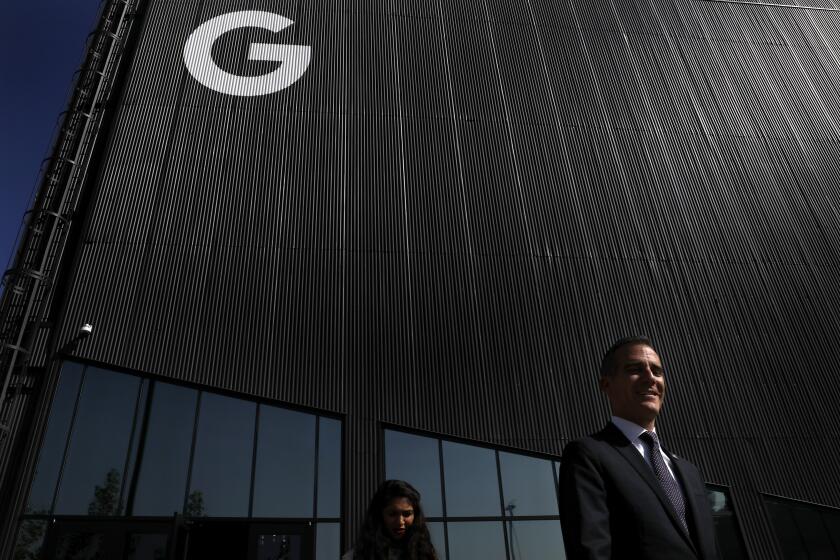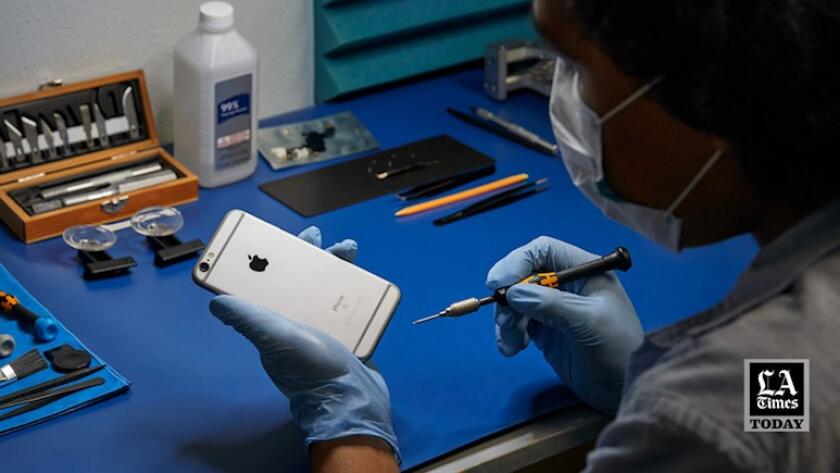Californians deserve the right to repair their electronics — even if Big Tech hates it

- Share via
For years now, tech companies and manufacturers have been making it harder and harder for consumers to undertake the simple act of fixing their own stuff. They withhold crucial parts and repair manuals, and even install software locks that make it so that only authorized retailers — and the manufacturers themselves — can carry out repairs. At a premium, of course.
This sounds like predatory behavior when you look at it laid out like that, but so far, it’s mostly worked — think of the last time your phone, smart watch or tablet broke down. Did you try to fix it? Did you consider taking it to a repair shop? Or did you shrug, shove it into a drawer, figuring it was too time-consuming, expensive and inconvenient to fix and, well, you were probably due for a new one anyway?
If you’re like most people, you went for the upgrade. And there’s absolutely no shame in that — that’s exactly what companies like Apple and Samsung have conditioned us to do. It’s by design that they make it feel hard.
Which is precisely why California lawmakers should turn the trend around, now that there’s a prime opportunity to do so. Democratic Sen. Susan Talamantes Eggman of Stockton has sponsored SB 244, a bill that would enact what’s become known as the right to repair in California.
This would be a huge deal — right to repair is making its way through statehouses across the nation; last year, New York passed the first major law of its kind, and earlier this year, Colorado passed a similar law for farm equipment (a surprisingly big deal, because tractor makers including John Deere had taken to locking down their vehicles with software, making repairing the equipment a major pain, or prohibitively expensive).
Artists, journalists and screenwriters are leading the fight against employers who would seek to replace them with the products of ChatGPT and other generative AI software.
If the right to repair passes in California — not only the nation’s largest economy and most populous state but also home to the tech industry itself — it would be a powerful signal indeed.
The bill would require device manufacturers to do a few key things: give consumers a way to open any “digital locks” that might prevent them from fixing their stuff, make repair manuals public and sell parts to consumers who might want to buy them.
Pretty simple, and common sense!
As such, you may not be surprised to learn that right to repair laws are among the most popular pieces of legislation in existence. As in, phenomenally popular — last year, a Politico/Morning Consult poll found that 69% of registered voters supported the right to repair. Nearly 7 in 10 people, left and right combined, like these laws. In an era where support for the president hovers around 44% and no one can agree on much of anything, 69% is a sort of miracle. In California, support levels are even higher, around 75%.
This is probably because it just makes sense: You paid money for a thing, you own it. The company that sold it to you should not have any right to prevent you from fixing it if it breaks down. That company should in fact make it easier to fix the thing it sold you, not harder.
If I were to get all pundity about it, I would say that conservatives support the right to repair because it promotes the DIY spirit and saves money, and liberals like it because it means less landfill and wrests some control out of the hands of the tech monopolies. Maybe both sides like that.
And everyone likes saving money. A report from the consumer advocacy group CalPIRG found that the average American household spends about $1,767 buying new electronics every year.
Sander Kushen, a consumer advocate with U.S. PIRG, told me that, with the right to repair instated, families tend to save about $382 a year off that sum. All told, that would amount to about $5 billion in savings in California alone.
“That’s money that people could be spending on food, on their homes,” Kushen says, “and not on electronics that they shouldn’t have to replace anyway. “Families are struggling right now, and the opportunity to save on repair is important.”
He also points to the environmental benefits, noting that e-waste is the fastest-growing waste stream in the world right now, and right to repair legislation is a serious way to go easier on our landfills — a point the Times editorial board underlined just last week.
Finally, repair is crucial for local economies. Independent repair shops are local businesses that create jobs and provide a genuine social good. And many have been struggling as Apple and other manufacturers have turned the screws on repair.
‘Mrs. Davis,’ from ‘Lost’ creator Damon Lindelof and Tara Hernandez, asks: Do we want to live in a world where technology makes our decisions for us?
“A lot of the independent repair shops we talked to,” Kushen says, “there’s a lot of urgency for them.” There are a lot of reasons for this, but a big one is that they simply can’t afford the machines and licenses the big manufacturers now require of repair shops to get certified as authorized — and they can’t get the tools and manuals they need to do the repairs at all.
A similar bill made its way to Sacramento last year, but it died in committee. The same thing happened the year before. Kushen says last year, he called up a lot of repair businesses to gin up support for that effort, and he did so again this year. “We’ve called a lot of these shops back to ask for support — and they’ve gone out of business.”
For a lot of small shops, it’s a matter of life and death. So what’s the holdup? If the bill is overwhelmingly popular, saves Californians money, helps the environment and creates jobs, what could possibly be preventing it from moving ahead?
Three guesses, and the small ones don’t count.
Yes, it’s Big Tech, which, as we’ve made clear, has an interest in preventing ad hoc repairs of its stuff. Right to repair would lead people to buy fewer new devices, or decline to shell out for the authorized repair services these companies get a cut of. Now, they don’t say that stuff out loud — right to repair is too popular. They say that devices are too complex for regular old repair people to handle, so only they can do right by consumers. They say independent fixers are a security risk. That’s BS, and nothing short of an FTC report has shown it to be so.
No, it’s a good old-fashioned case of corporate gamesmanship.
“Tech lobbyists have a huge presence in California,” Elizabeth Chamberlain, the sustainability director of the repair company IFixit, tells me, “and we know that the closer this bill gets to passing, the more they’ll be working overtime.” (Full disclosure: I’ve done some editorial advising for IFixit in the past.)
Increasingly offering products untethered to the average consumer’s needs, the tech industry has been dwelling in La La Land. Its real-world expansion into L.A. is no coincidence.
“Once the bill makes it through the Appropriations Committee, it goes to the Senate floor,” Chamberlain says. If it passes there, it has to run through the state Assembly. “We think it’s a great bill and it’s got a strong chance. But it’ll have to make it past the tech lobbyist gantlet.”
The chairman of the Senate Appropriations Committee, Democrat Anthony Portantino of Burbank, has never explained why the prior bills stalled out. But there’s good reason to bet it has something to do with that tech lobby.
But Chamberlain and Kushen both think this time could be different — there’s a real sense of momentum with right to repair having passed in New York and Colorado, and the public has gotten to know the issue better. For the sake of all the independent repair shops in Burbank and beyond, let’s hope that Portantino and company give the bill the stamp of approval. There are so few issues where quite literally everyone wins (except, I guess, Apple and Samsung, two of the richest companies in human history) and everyone’s happy about a law, but right to repair is one of them.
California deserves to be able to fix its stuff. Let’s make it happen.
- Share via
Watch L.A. Times Today at 7 p.m. on Spectrum News 1 on Channel 1 or live stream on the Spectrum News App. Palos Verdes Peninsula and Orange County viewers can watch on Cox Systems on channel 99.
- Share via
Watch L.A. Times Today at 7 p.m. on Spectrum News 1 on Channel 1 or live stream on the Spectrum News App. Palos Verdes Peninsula and Orange County viewers can watch on Cox Systems on channel 99.











